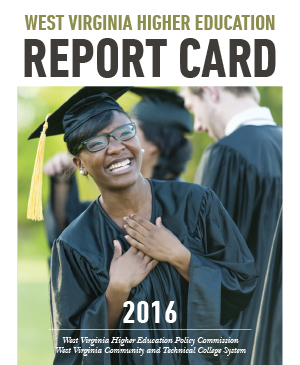Higher ed ‘Report Card’: State colleges retaining, graduating more students

Statewide initiatives generating results despite budget challenges
CHARLESTON, W.Va. – West Virginia’s state colleges and universities are retaining more students and have generated record numbers of graduates in recent years, thanks to statewide efforts to improve student success. However, continued positive results could be hindered by budget challenges and increased tuition costs, state higher education officials told members of Legislative Oversight Commission on Education Accountability (LOCEA) today.
During the meeting, representatives from the West Virginia Higher Education Policy Commission (Commission) and West Virginia Community and Technical College System (CTCS) provided an overview of findings from the annual West Virginia Higher Education Report Card, a report which, they say, offers evidence of steady progress toward addressing the state’s evolving workforce and community needs.
“Underneath all of the statistics, the 2016 Report Card tells a story of faculty and staff working tirelessly, day in and day out, to support West Virginia’s students, families and communities,” Dr. Paul Hill, Chancellor of the Commission, said. “Over the past five years, the Policy Commission, Community College Council, and our schools have focused relentlessly on improving access to higher education, supporting our students and fostering research and economic development. This report shows our efforts are making headway.”
The report’s findings include
- Increases in college retention (the highest rate in the past five years);
- A record number of degrees awarded;
- Huge gains in the completion rates of entry-level math and English courses;
- Improved retention and graduate rates for low-income and minority students;
- Reduced student loan default rates; and
- Increases in science, technology, engineering and math (STEM) graduates (up 12 percent since 2010).
“These gains are reflective of the strong emphasis our system has placed on college access and success,” Dr. Sarah Tucker, Chancellor of the CTCS said. “West Virginia needs more college graduates to meet workforce demands and grow our economy. I am very proud of the work we are doing to address that need and to extend the life-changing opportunities a college education provides to more students.”
The two agencies have recently employed several outreach and policy initiatives to assist students in enrolling in college and to promote college completion and success. For example, the Commission’s federally funded West Virginia “Gaining Early Awareness and Readiness for Undergraduate Programs (GEAR UP)” program provides college mentoring and planning services to middle and high school students in ten counties. The statewide College Foundation of West Virginia (CFWV) initiative offers information, including text message counseling, to help students understand college options and navigate the application and enrollment processes. And recent policy changes overhauling the delivery of developmental education and encouraging students to enroll in a minimum of 15 credit hours per semester are showing promising results toward raising college graduation rates.
While the report showed signs of improvement, officials also cautioned that the system faces significant challenges including relatively flat enrollment and shrinking financial resources leading to continual tuition increases.
“Enrollment among adult learners is particularly troubling,” Dr. Tucker said “During the most recent recession, we saw these students flock to our campuses. But, as the economy improved, enrollment among that population declined sharply. If we are serious about moving West Virginia’s economy forward, we must retrain adults for the jobs of the future and better align our educational programs to meet workforce needs.”
Dr. Tucker pointed to two recent programs, highlighted in the Report Card, as promising pathways toward meeting those goals. The first, a pilot project with the Department of Health and Human Resources, encourages individuals who receive funds from the federal Temporary Assistance for Needy Families (TANF) program to enroll in community college programs in in-demand fields. The second, the Bridging the Gap consortium funded through a federal grant from the Department of Labor, focuses on retraining adults — in particular displaced workers and veterans — for high-wage, high-demand jobs within the areas of energy, manufacturing, construction and information technology. More than 155 students participated in the TANF training program in 2016, and nearly 4,000 students have participated in the Bridging the Gap initiative since it began three years ago.
Though the agencies have been working hard to extend higher education opportunities to more West Virginians, Dr. Hill noted that recent budget cuts, amounting to more than 14 percent across the system over the past four years, have forced campuses to make tough choices in regards to both tuition and programs and services.
“Many areas of our state are struggling financially and our campuses have struggled, too,” Dr. Hill said. To make up for shortfalls, our institutions have had to find additional revenue sources and look to increases in tuition. These trends are worrisome because I fear concerns over cost and debt will hinder our students from pursuing the education and training they need to thrive and grow our communities.”
To help campuses do more with less, the Commission and CTCS have been working to facilitate shared services, streamline administrative processes and eliminate unnecessary rules and regulations. In the last year alone, the agencies have worked with the Legislature to cut more than 25 procedural and legislative rules, interpretive memoranda and reporting requirements.
“We can’t allow shrinking resources to kill our productivity,” Dr. Hill said. “So, even in the face of declining resources, we are moving forward with our goal to double the number of degrees produced in the state by 2025. Now, more than ever, West Virginia needs a strong higher education system producing skilled, knowledgeable graduates. The future of our state depends on it.”
A copy of the 2016 West Virginia Higher Education Report Card is available here: https://www.wvhepc.edu/wp-content/uploads/2017/01/Report-Card.pdf
###
